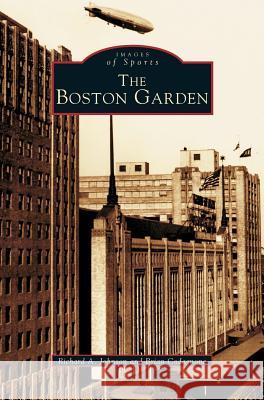Boston Garden » książka
Boston Garden
ISBN-13: 9781531607531 / Angielski / Twarda / 2002 / 130 str.
For seven decades, the Boston Garden functioned as both a de facto community center and the indoor entertainment hub of New England. Known to millions as the home of the Bruins and Celtics, the Garden was also home to a variety of other events. The Boston Garden was truly a "people's palace," serving as a venue for events both grand and humble, monumental and mundane. It was nothing less than the city's playpen, music hall, political clubhouse, tavern, cathedral, and living room. The Boston Garden opened on November 17, 1928, to an overflow audience who witnessed local boxer Dick "Honeyboy" Finnegan defeat reigning world featherweight champion Andre Routis in a non-title bout. Three days later, the Bruins greeted a crowd that fire department officials estimated was nearly four thousand above maximum capacity. The Boston Garden captures these moments and the unique relationship that was forged with the city right from the beginning. During the Great Depression, the Garden hosted countless community events, such as free public skating and religious services. It was Boston's main attraction with concerts, wrestling, school sports, and the ever popular Bruins. Later years saw the birth of the Boston Celtics in 1946 and their unsurpassed record of sixteen world championships. Following World War II and through the baby boomer years, performers as diverse as Liberace, Elvis, and the Rolling Stones also packed fans in. The Boston Garden was demolished in 1998 to make room for the Central Artery and private development, but it lives on in the hearts of New Englanders.
For seven decades, the Boston Garden functioned as both a de facto community center and the indoor entertainment hub of New England. Known to millions as the home of the Bruins and Celtics, the Garden was also home to a variety of other events. The Boston Garden was truly a "peoples palace," serving as a venue for events both grand and humble, monumental and mundane. It was nothing less than the citys playpen, music hall, political clubhouse, tavern, cathedral, and living room. The Boston Garden opened on November 17, 1928, to an overflow audience who witnessed local boxer Dick "Honeyboy" Finnegan defeat reigning world featherweight champion Andre Routis in a non-title bout. Three days later, the Bruins greeted a crowd that fire department officials estimated was nearly four thousand above maximum capacity. The Boston Garden captures these moments and the unique relationship that was forged with the city right from the beginning. During the Great Depression, the Garden hosted countless community events, such as free public skating and religious services. It was Bostons main attraction with concerts, wrestling, school sports, and the ever popular Bruins. Later years saw the birth of the Boston Celtics in 1946 and their unsurpassed record of sixteen world championships. Following World War II and through the baby boomer years, performers as diverse as Liberace, Elvis, and the Rolling Stones also packed fans in. The Boston Garden was demolished in 1998 to make room for the Central Artery and private development, but it lives on in the hearts of New Englanders.











